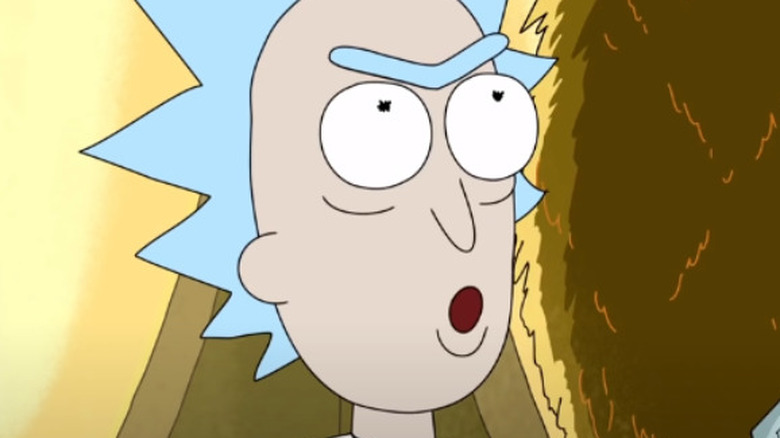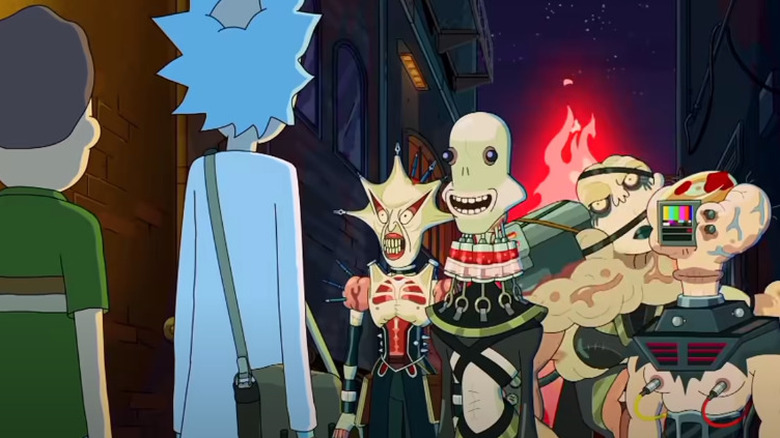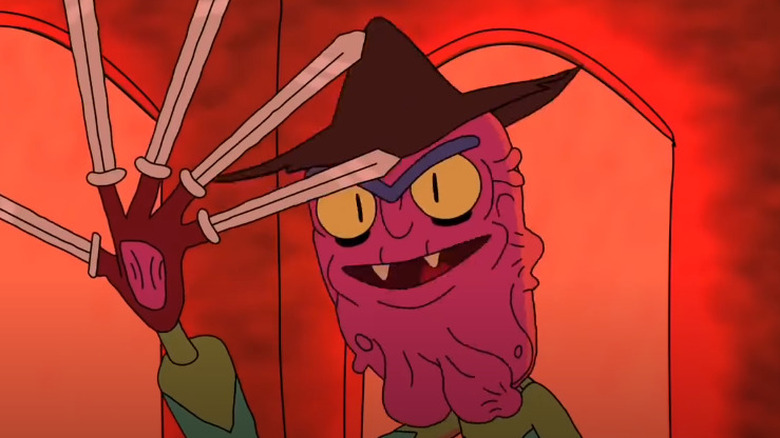Rick And Morty Fans Can't Help But Love These Horror Movie References
"Rick and Morty" is pop culture for people who love pop culture. One could argue that the show basically is one big pop culture reference itself, given that its origins lie in "The Real Animated Adventures of Doc and Mharti," Justin Roiland's send-up of "Back to the Future" (via Rolling Stone). Throughout its five seasons, "Rick and Morty" has referenced everything from "Breaking Bad" to "Mad Max" (per Vice), from "Community" to "Zardoz."
But no reference seems to excite fans quite like horror references. "Rick and Morty" is, after all, a work of cosmic horror, looking up to the skies and regarding the terror of an indifferent multiverse. Roiland and Dan Harmon's awareness of this is clearly reflected in H.P. Lovecraft's Cthulhu in the opening credits. The show is also littered with references to some of Stephen King's best works. It seems only natural then that the show attracts such loyal fandom from horror acolytes. And many of them clearly have a favorite "Rick and Morty" horror reference.
Fans love the Hellraiser reference
At the u/rickandmorty subreddit, u/nialldude3 asked for other fans to share their favorite pop culture parody from "Rick and Morty." Their particular favorite is the "Stand By Me" reference in Season 3's "The Ricklantis Mixup." Not exactly horror, even if it is an adaptation of Stephen King's novella "The Body" (via CinemaBlend).
It doesn't take long at all for the horror genre to show up though. "Definitely the Hellraiser parody," wrote u/malccy72. "Had me in stitches." They are referring to Season 5, Episode 5, "Amortycan Grickfitti," when a group of horribly mutilated interdimensional demons strongly resembling the Cenobites from the "Hellraiser" franchise first befriend then kidnap Jerry (Chris Parnell), believing Jerry's tedious personality to be a form of pain, and, for them, pleasure.
Since the original adaptation of Clive Barker's novella "The Hellbound Heart" in 1987, Pinhead (played most often by Doug Bradley) and the rest of the sadomasochistic Cenobites have appeared in ten films, with both a remake and an HBO series reportedly in the works. As far as "Rick and Morty" is concerned, this episode may have been the most brutal in terms of its treatment of Jerry, whose mediocre intelligence and milquetoast personality has made him into the series' longest-running punchline.
Not that his humiliation has ever stopped being funny. As u/timmi2tone32 wrote, "This brings me pain, which brings me pleasure."
Fans also love Scary Terry
Even more popular, however, is Scary Terry (Jess Harnell). In fact, the very first comment on the thread is from u/majordoobage, who wrote, " The Freddy Krueger parody b*tch." Several others agree. Scary Terry is, as the comment says, a parody of Robert Englund's iconic dreambound murderer from the "Nightmare on Elm Street" franchise, appearing in the second episode ever of "Rick and Morty," Season 1's "Lawnmower Dog." Rick (Justin Roiland) and Morty (also Roiland) encounter him while attempting to incept Morty's math teacher Mr. Goldenfold (Brandon Johnson) to give Morty good grades.
Like Freddy, Scary Terry invades dreams with the intent to kill. He's also horribly scarred and wears a beat up fedora. The only difference between Freddy and the legally safe knockoff Terry is that swords for fingers rather than knives. Oh, and, as many subreddit comments remind us, he says "b*tch" a lot. When u/geoffbowman points out that the episode was equal parts "Nightmare" and "Inception," u/majordoobage is quick to reply "Yeah b*tch I know but the Scary Terry part was my favorite, b*tch." You get the point by now.
Unlike the Cenobites, Rick and Morty end up befriending Terry, even helping him overcome some deep-seated feelings of inadequacy. In return, Terry ends up helping the two finish Mr. Goldenfold's inception, ensuring Morty is able to continue joining his grandfather in exploring the terror of the cosmos.


